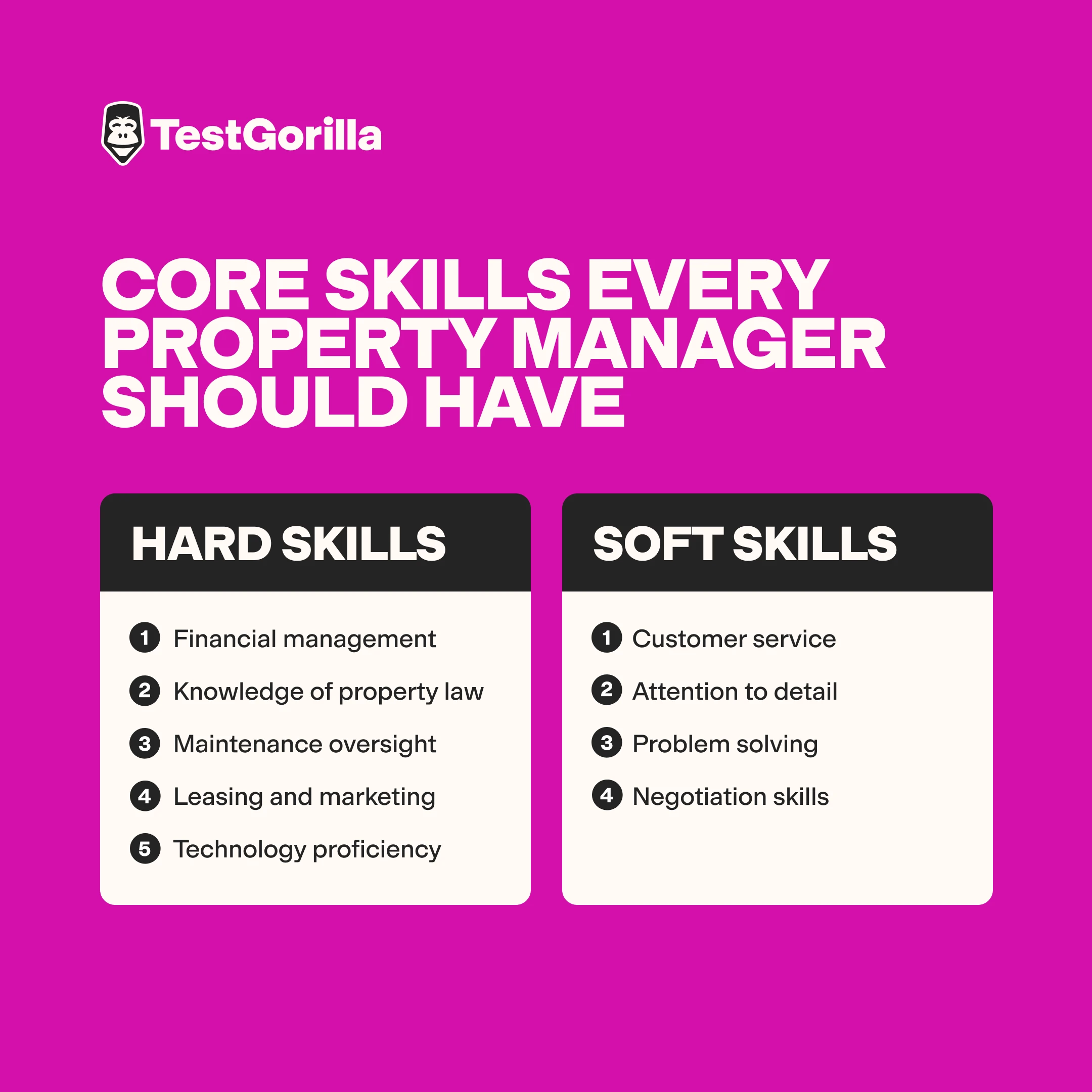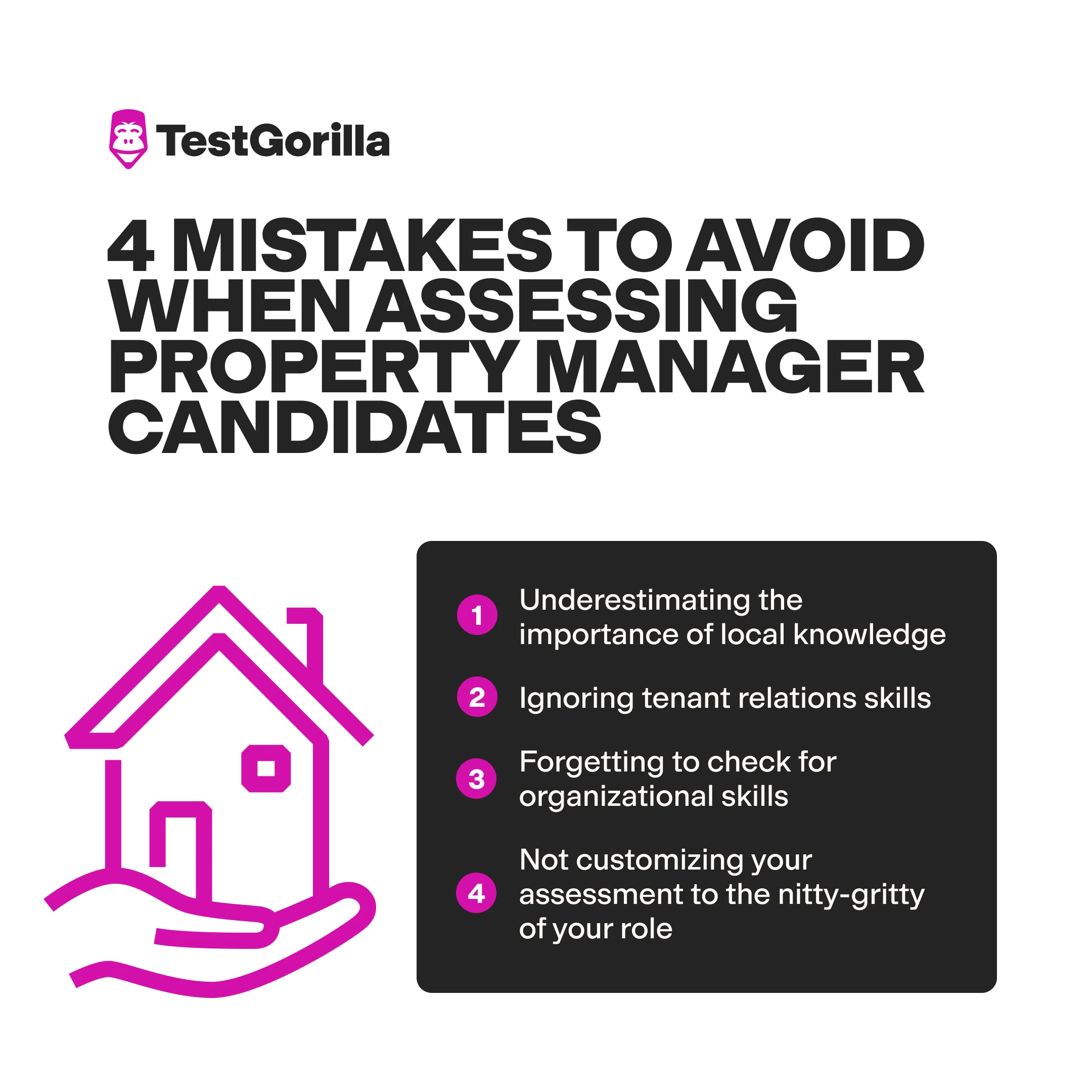Property managers wear many hats. They juggle everything from maintaining properties to collecting rent, managing tenants, and helping out owners. The stakes are high, and hiring the wrong person can mean unwanted property issues, unhappy tenants, and – worst of all – financial losses.
Unfortunately, this happens more often than you think. Finding someone who can step up to the challenge and handle all those responsibilities? It’s not easy.
Luckily, we’re here to sort you out. In this guide, we’ll walk you through 9 essential skills to look for in property managers and show you how to hire a property manager who’s right for the job.
Table of contents
What is a property manager?
A property manager is in charge of running a real estate property. Their daily role includes a bit of everything: collecting rent, handling tenant complaints, sorting out repairs, and keeping the property in tip-top shape. They’re the go-between for tenants, property owners, and contractors, making sure everyone's happy and things are ticking along nicely.
Additionally, they play a huge role in keeping the property profitable. They set the rent prices, advertise vacancies, and vet potential tenants to minimize problems and maximize cash. They also keep a close eye on the budget and make smart choices to boost the property’s value over time.
So, think of a property manager as the heart of a property’s operations. Whether they’re making tenants feel at home or generating income for the property owner, they’re key to making everything work.
Core skills every property manager should have
The best property manager candidates will have the below hard and soft skills.
Hard skills
Financial management: Property managers need to be good with numbers since they manage income and expenses while making sure the property is making money.
Knowledge of property law: Look for someone who knows the ins and outs of local and federal property rules so your business is always on the right side of the law.
Maintenance oversight: The best candidates can quickly identify and address any pertinent repairs, address maintenance issues, and keep the place looking good.
Leasing and marketing: Property managers need to fill vacancies smartly and swiftly to avoid big gaps in cash flow. This includes advertising properties using traditional or digital marketing, screening tenants with background and credit checks to avoid future headaches, and handling all the legal paperwork.
Technology proficiency: Look for applicants who are tech-savvy and can use the right apps for everything from fixing leaks and chatting with tenants to producing income reports with tools like Excel or QuickBooks.
Soft skills
Customer service: Unlike most jobs, property managers have multiple types of customers. They must provide exceptional support to property owners who are the bread and butter of their business. But they’ve also got to keep their tenants smiling and sticking around for the long haul.
Attention to detail: From spotting a crack in the wall during an inspection to getting every detail right in a lease, good property managers have a keen eye for detail.
Problem solving: When things go sideways – like a burst pipe or a tenant squabble – the best candidates need to keep a cool head, think on their feet, and fix things as fast as possible.
Negotiation skills: Look for applicants who can negotiate higher rents with tenants and persuade contractors to give them better prices for repairs and maintenance. These folks can make all the difference in improving your profits.
How to assess property manager candidates
Once you have a clear picture of what skills you’re looking for, you need to know how to assess these skills properly. Scanning someone’s resume, for instance, won’t tell you if they have what it takes to succeed. But TestGorilla’s talent assessments will.
We offer 400 tests that look at applicants’ hard and soft skills, personality traits, cognitive abilities, and cultural contributions. This way, you can base your hiring decisions on how candidates perform today rather than what their resume says about the past.
What’s great about our platform? You can combine up to five tests in a single assessment.
Here‘s how we suggest you assess your property manager candidates.
Assess candidates’ hard skills
See what your candidates know and which technical skills they possess with these tests.
Our Microsoft Excel Skills test will tell you if an applicant can use Excel to store, organize, and analyze data. Excel know-how can help them read property price trends, optimize income and expenses, and present results to property owners.
TestGorilla’s Numerical Reasoning test looks at candidates' general knack for working with numbers, which is useful for a range of property management tasks – from valuing rent to calculating profits.
The Video Content Creator test is a great way to check if candidates can create captivating property videos that help attract tenants’ interest.
Our Instagram Marketing test will show you if property managers can use Instagram to engage potential tenants and market vacant properties. This test is a great option if your target tenants are big on Instagram!
Want to test candidates on more? You can add custom questions to any of our tests to make sure you’re happy with what you’re assessing.
Evaluate soft skills
A huge part of this job involves dealing with people. Use the tests below to dive deeper into your candidates’ soft skills and attributes.
TestGorilla’s Customer Service test helps you see if applicants have what it takes to impress your customers – be it property owners or tenants.
Our Negotiation test is an easy way to check if candidates can get you the best deals – for instance, by closing higher rent and getting discounts from contractors to lower your costs.
The Attention to Detail (Visual) test will help you see how candidates work with visual cues. This will help you see if they can quickly spot and fix even the smallest issues in a property, lease agreement, or income report.
Our Problem Solving test shows you how candidates deal with real-life problems and if they have what it takes to come up with quick solutions and make good decisions before things get worse.
Dig deeper into personality traits and cultural contributions
Even candidates with all the right skills can fail in the job if they don’t mesh well with the tenants. And if you’re a property owner looking for someone to manage your property, you’ll want to make sure that you mesh with them, too. Or, if you help run a larger business – like a real estate or property management company – it’ll be important for your property manager to vibe with your team and customers.
You might use these tests to learn about candidates’ personalities and values.
TestGorilla’s Enneagram, DISC, 16 Personalities, and Motivation tests give you a well-rounded view of who your candidates are, their strengths and weaknesses, and what makes them tick. This way, you can check that they’ll vibe with tenants, gel with your team (if you have one), and enjoy the work before bringing them aboard.
If your property manager will be joining a larger team, then be sure to use our Culture Add test to take things a step further. Simply fill out a survey ranking what values and qualities are important for the job – then see how candidates rank the same values. These results will show you if they’ll fit in and contribute to your team’s culture and working practices.
Interview candidates before making an offer
Finally, don’t forget to interview your candidates with in-person or virtual interviews. Ask them behavioral interview questions that let you peek into how they’ve handled tricky situations in the past.
You can ask them questions like:
Tell me about a time you’ve had to deal with a tenant who was consistently late with rent payments. What happened, and how did you handle the situation?
This question will tell you how applicants usually manage difficult scenarios and if they can get what they need while still being understanding with tenants.
Here’s another:
What steps do you usually take when setting the rental price for a property? Mention any specific software or tools you use.
With this question, you’ll learn how candidates use market data, property conditions, and more to figure out rent prices. The additional question can tell you more about the tools and technologies they’re familiar with.
Asking these questions is an excellent way to interact with someone before hiring them. But it also gives you the opportunity to dive deeper into their backgrounds, ask follow-up questions, and check that they truly know their stuff – including stuff you didn’t touch on with your tests.
4 mistakes to avoid when assessing property manager candidates
Steer clear of these common mistakes that can lead to hiring the wrong person for your property manager role.
1. Underestimating the importance of local knowledge
Imagine hiring a property manager who doesn't know the neighborhood, has no contractor connections, and is clueless about what local renters are looking for. Not only will they struggle to fill vacancies, but they’ll also eat into your profits.
Even worse, imagine that they don’t understand local rental laws. They might try to charge tenants illegal fees – which could really get you or your business into hot water.
Always check if candidates can chat confidently about local market trends and regulations before hiring them.
2. Ignoring tenant relations skills
No matter how great a candidate is at analyzing the market, pricing rent, and negotiating with contractors, they’ll fail as property managers if they don’t know how to handle tenants. Candidates who can’t resolve conflicts or address tenant concerns properly will lead to people moving out faster than they moved in.
Make sure your candidate can share a story or two about keeping tenants happy during tough situations before you make an offer. Even if they’re inexperienced, you should check that they have the people management skills needed for the job.
3. Forgetting to check for organizational skills
A disorganized property manager can be disastrous for business. They could miss crucial maintenance checks, mess up lease renewal dates, and even mix up property performance reports – leaving tenants, owners, and their managers dissatisfied.
Ask candidates to describe how they manage their tasks and keep everything running on schedule. You're looking for someone who's got their ducks in a row – not someone who's always playing catch-up.
4. Not customizing your assessment to the nitty-gritty of your role
All property manager roles differ, so don't overlook the nitty-gritty of what the property manager will actually do for you or your company – whether it's handling short-term vacation homes, long-term rental properties, or apartment complexes. Each gig needs different skills.
For instance, short-term rental managers often need to charm guests, while apartment managers are all about keeping the peace among tenants. For those managing individual properties, it's all about building long-term relationships with tenants, ensuring smooth lease agreements, and staying on top of property maintenance.
Make sure your candidate knows the ropes of the type of property management they're dealing with. This way, you can make sure they have the exact skill set you need.
FAQs
Need more information? Check out our answers to some frequently asked questions.
How much do property managers earn?
A property manager's salary depends on their location, experience, and other factors. For instance, a candidate in New York, NY, will likely demand a higher salary than someone in Atlanta, GA. Data from Indeed shows that, on average, US property managers make about $59,597 per year.
Should I hire a property manager with less experience?
When it comes to managing a high-stakes property, difficult client, or tricky tenants, most companies prefer to hire someone who’s been in the game for a while.
But focusing solely on years in the field might mean you overlook a great candidate with fresh ideas, new technologies, and a modern approach to property management. In most cases, you should focus on skills rather than experience.
Consider giving skilled people a chance to work on less risky properties or under a senior property manager, even if they’re newer to the field.
What personality traits do good property managers have?
The best property managers are organized, adaptable, and charming. They're problem-solvers who stay cool under pressure and always have a way with words when dealing with tenants and owners alike.
Snag the best property managers with TestGorilla
The right property manager is a jack-of-all-trades – balancing tenant management with property upkeep and savvy financial skills. That’s why glancing over a resume isn’t nearly enough to hire the right person for the job. You've got to see them in action to truly assess their skills.
Our talent assessments can help you dig deep into candidates' knowledge, skills, and traits so you can find a property manager who really fits the bill.
Ready to upgrade your hiring process? Dive into our test library, book a live demo, or start a free account with us today.
Related posts
Hire the best candidates with TestGorilla
Create pre-employment assessments in minutes to screen candidates, save time, and hire the best talent.
Latest posts
The best advice in pre-employment testing, in your inbox.
No spam. Unsubscribe at any time.

Hire the best. No bias. No stress.
Our screening tests identify the best candidates and make your hiring decisions faster, easier, and bias-free.
Free resources
This checklist covers key features you should look for when choosing a skills testing platform
This resource will help you develop an onboarding checklist for new hires.
How to assess your candidates' attention to detail.
Learn how to get human resources certified through HRCI or SHRM.
Learn how you can improve the level of talent at your company.
Learn how CapitalT reduced hiring bias with online skills assessments.
Learn how to make the resume process more efficient and more effective.
Improve your hiring strategy with these 7 critical recruitment metrics.
Learn how Sukhi decreased time spent reviewing resumes by 83%!
Hire more efficiently with these hacks that 99% of recruiters aren't using.
Make a business case for diversity and inclusion initiatives with this data.



















